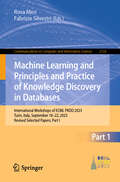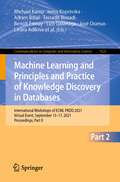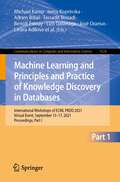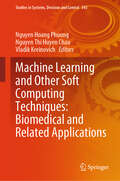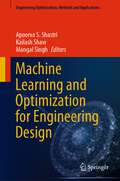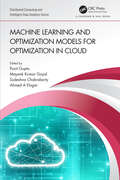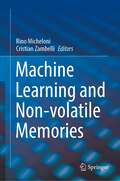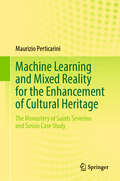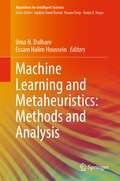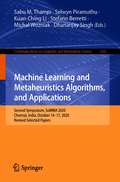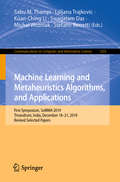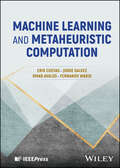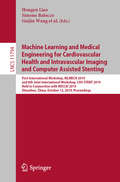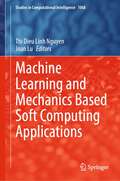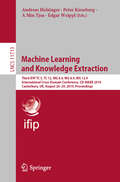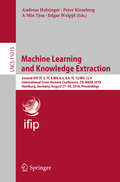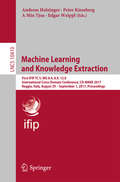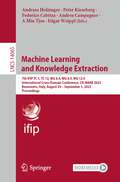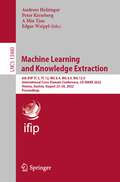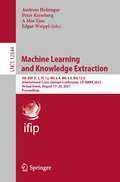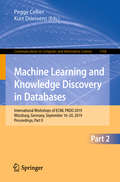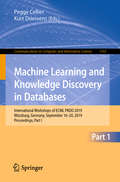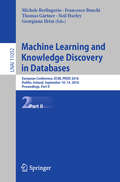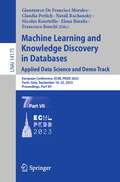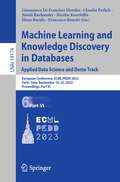- Table View
- List View
Machine Learning and Principles and Practice of Knowledge Discovery in Databases: International Workshops of ECML PKDD 2023, Turin, Italy, September 18–22, 2023, Revised Selected Papers, Part I (Communications in Computer and Information Science #2133)
by Fabrizio Silvestri Rosa MeoThe five-volume set CCIS 2133-2137 constitutes the refereed proceedings of the workshops held in conjunction with the Joint European Conference on Machine Learning and Knowledge Discovery in Databases, ECML PKDD 2023, which took place in Turin, Italy, during September 18-22, 2023. The 200 full papers presented in these proceedings were carefully reviewed and selected from 515 submissions. The papers have been organized in the following tracks: Part I: Advances in Interpretable Machine Learning and Artificial Intelligence -- Joint Workshop and Tutorial; BIAS 2023 - 3rd Workshop on Bias and Fairness in AI; Biased Data in Conversational Agents; Explainable Artificial Intelligence: From Static to Dynamic; ML, Law and Society; Part II: RKDE 2023: 1st International Tutorial and Workshop on Responsible Knowledge Discovery in Education; SoGood 2023 – 8th Workshop on Data Science for Social Good; Towards Hybrid Human-Machine Learning and Decision Making (HLDM); Uncertainty meets explainability in machine learning; Workshop: Deep Learning and Multimedia Forensics. Combating fake media and misinformation; Part III: XAI-TS: Explainable AI for Time Series: Advances and Applications; XKDD 2023: 5th International Workshop on eXplainable Knowledge Discovery in Data Mining; Deep Learning for Sustainable Precision Agriculture; Knowledge Guided Machine Learning; MACLEAN: MAChine Learning for EArth ObservatioN; MLG: Mining and Learning with Graphs; Neuro Explicit AI and Expert Informed ML for Engineering and Physical Sciences; New Frontiers in Mining Complex Patterns; Part IV: PharML, Machine Learning for Pharma and Healthcare Applications; Simplification, Compression, Efficiency and Frugality for Artificial intelligence; Workshop on Uplift Modeling and Causal Machine Learning for Operational Decision Making; 6th Workshop on AI in Aging, Rehabilitation and Intelligent Assisted Living (ARIAL); Adapting to Change: Reliable Multimodal Learning Across Domains; AI4M: AI for Manufacturing; Part V: Challenges and Opportunities of Large Language Models in Real-World Machine Learning Applications; Deep learning meets Neuromorphic Hardware; Discovery challenge; ITEM: IoT, Edge, and Mobile for Embedded Machine Learning; LIMBO - LearnIng and Mining for BlOckchains; Machine Learning for Cybersecurity (MLCS 2023); MIDAS - The 8th Workshop on MIning DAta for financial applicationS; Workshop on Advancements in Federated Learning.
Machine Learning and Principles and Practice of Knowledge Discovery in Databases: International Workshops of ECML PKDD 2021, Virtual Event, September 13-17, 2021, Proceedings, Part II (Communications in Computer and Information Science #1525)
by Christopher Buckley Min Zhou Lee Cooper Rita Ribeiro Donato Malerba Bodo Rosenhahn João Gama Riccardo Guidotti Anna Monreale Pedro M. Ferreira Meng Sun Philippe Fournier-Viger Ricard Gavaldà Michael Kamp Yamuna Krishnamurthy Valerio Bitetta Ilaria Bordino Andrea Ferretti Francesco Gullo Christine Largeron Massimiliano Ruocco Giovanni Ponti Tim Verbelen Pablo Lanillos Holger Fröning Franz Pernkopf Gregor Schiele Michaela Blott Lorenzo Severini Przemyslaw Biecek Irena Koprinska Linara Adilova Ibéria Medeiros Eirini Ntoutsi Salvatore Rinzivillo Jefrey Lijffijt Adrien Bibal Tassadit Bouadi Benoît Frénay Luis Galárraga José Oramas Bo Kang Tiphaine Viard Pascal Welke Erlend Aune Claudio Gallicchio Günther Schindler Mykola Pechenizkiy Daniela Cialfi Maxwell Ramstead Giuseppina Andresini M. Saqib Nawaz Sebastian Ventura Naghmeh Ghazaleh Jonas Richiardi Damian Roqueiro Diego Saldana Miranda Konstantinos Sechidis Guilherme GraçaThis two-volume set constitutes the refereed proceedings of the workshops which complemented the 21th Joint European Conference on Machine Learning and Knowledge Discovery in Databases, ECML PKDD, held in September 2021. Due to the COVID-19 pandemic the conference and workshops were held online. The 104 papers were thoroughly reviewed and selected from 180 papers submited for the workshops. This two-volume set includes the proceedings of the following workshops:Workshop on Advances in Interpretable Machine Learning and Artificial Intelligence (AIMLAI 2021)Workshop on Parallel, Distributed and Federated Learning (PDFL 2021)Workshop on Graph Embedding and Mining (GEM 2021)Workshop on Machine Learning for Irregular Time-series (ML4ITS 2021)Workshop on IoT, Edge, and Mobile for Embedded Machine Learning (ITEM 2021)Workshop on eXplainable Knowledge Discovery in Data Mining (XKDD 2021)Workshop on Bias and Fairness in AI (BIAS 2021)Workshop on Workshop on Active Inference (IWAI 2021)Workshop on Machine Learning for Cybersecurity (MLCS 2021)Workshop on Machine Learning in Software Engineering (MLiSE 2021)Workshop on MIning Data for financial applications (MIDAS 2021)Sixth Workshop on Data Science for Social Good (SoGood 2021)Workshop on Machine Learning for Pharma and Healthcare Applications (PharML 2021)Second Workshop on Evaluation and Experimental Design in Data Mining and Machine Learning (EDML 2020)Workshop on Machine Learning for Buildings Energy Management (MLBEM 2021)
Machine Learning and Principles and Practice of Knowledge Discovery in Databases: International Workshops of ECML PKDD 2021, Virtual Event, September 13-17, 2021, Proceedings, Part I (Communications in Computer and Information Science #1524)
by Christopher Buckley Min Zhou Lee Cooper Rita Ribeiro Donato Malerba Bodo Rosenhahn João Gama Riccardo Guidotti Anna Monreale Pedro M. Ferreira Meng Sun Philippe Fournier-Viger Ricard Gavaldà Michael Kamp Yamuna Krishnamurthy Valerio Bitetta Ilaria Bordino Andrea Ferretti Francesco Gullo Christine Largeron Massimiliano Ruocco Giovanni Ponti Tim Verbelen Pablo Lanillos Holger Fröning Franz Pernkopf Gregor Schiele Michaela Blott Lorenzo Severini Przemyslaw Biecek Irena Koprinska Linara Adilova Ibéria Medeiros Eirini Ntoutsi Salvatore Rinzivillo Jefrey Lijffijt Adrien Bibal Tassadit Bouadi Benoît Frénay Luis Galárraga José Oramas Bo Kang Tiphaine Viard Pascal Welke Erlend Aune Claudio Gallicchio Günther Schindler Mykola Pechenizkiy Daniela Cialfi Maxwell Ramstead Giuseppina Andresini M. Saqib Nawaz Sebastian Ventura Naghmeh Ghazaleh Jonas Richiardi Damian Roqueiro Diego Saldana Miranda Konstantinos Sechidis Guilherme GraçaThis two-volume set constitutes the refereed proceedings of the workshops which complemented the 21th Joint European Conference on Machine Learning and Knowledge Discovery in Databases, ECML PKDD, held in September 2021. Due to the COVID-19 pandemic the conference and workshops were held online. The 104 papers were thoroughly reviewed and selected from 180 papers submited for the workshops. This two-volume set includes the proceedings of the following workshops:Workshop on Advances in Interpretable Machine Learning and Artificial Intelligence (AIMLAI 2021)Workshop on Parallel, Distributed and Federated Learning (PDFL 2021)Workshop on Graph Embedding and Mining (GEM 2021)Workshop on Machine Learning for Irregular Time-series (ML4ITS 2021)Workshop on IoT, Edge, and Mobile for Embedded Machine Learning (ITEM 2021)Workshop on eXplainable Knowledge Discovery in Data Mining (XKDD 2021)Workshop on Bias and Fairness in AI (BIAS 2021)Workshop on Workshop on Active Inference (IWAI 2021)Workshop on Machine Learning for Cybersecurity (MLCS 2021)Workshop on Machine Learning in Software Engineering (MLiSE 2021)Workshop on MIning Data for financial applications (MIDAS 2021)Sixth Workshop on Data Science for Social Good (SoGood 2021)Workshop on Machine Learning for Pharma and Healthcare Applications (PharML 2021)Second Workshop on Evaluation and Experimental Design in Data Mining and Machine Learning (EDML 2020)Workshop on Machine Learning for Buildings Energy Management (MLBEM 2021)
Machine Learning and Other Soft Computing Techniques: Biomedical and Related Applications (Studies in Systems, Decision and Control #543)
by Vladik Kreinovich Nguyen Hoang Phuong Nguyen Thi Huyen ChauThis book contains applications to various health-related problems, from designing and maintaining a proper diet to enhancing hygiene to analysis of mammograms and left-right brain activity to treating diseases such as diabetes and drug addictions. Health issues are very important. So naturally whatever new data processing technique appears, researchers try to apply it to health issues as well. From this viewpoint, Artificial Intelligence (AI) and Computational Intelligence (CI) techniques are no exception: they have been successfully applied to medicine, and more promising applications are on the way. Applications of AI and CI techniques to health issues are the main focus of this book. Health issues are also very delicate, because human bodies are complex organisms. No matter how interesting and promising are new ideas and new techniques, there is always a possibility of unexpected side effects. Because of this, we cannot apply untested methods to patients, and we first need to test these methods on other less critical applications. Several book chapters describe such applications—whose success paves the way for these methods to be used in biomedical situations. These applications range from human/face detection to predicting student success to predicting election results to explaining the observed intensity of space light. We hope that this book helps practitioners and researchers to learn more about computational intelligence techniques and their biomedical applications—and to further develop this important research direction.
Machine Learning and Optimization for Engineering Design (Engineering Optimization: Methods and Applications)
by Apoorva S. Shastri Mangal Singh Kailash ShawThis book aims to provide a collection of state-of-the-art scientific and technical research papers related to machine learning-based algorithms in the field of optimization and engineering design. The theoretical and practical development for numerous engineering applications such as smart homes, ICT-based irrigation systems, academic success prediction, future agro-industry for crop production, disease classification in plants, dental problems and solutions, loan eligibility processing, etc., and their implementation with several case studies and literature reviews are included as self-contained chapters. Additionally, the book intends to highlight the importance of study and effectiveness in addressing the time and space complexity of problems and enhancing accuracy, analysis, and validations for different practical applications by acknowledging the state-of-the-art literature survey. The book targets a larger audience by exploring multidisciplinary research directions such as computer vision, machine learning, artificial intelligence, modified/newly developed machine learning algorithms, etc., to enhance engineering design applications for society. State-of-the-art research work with illustrations and exercises along with pseudo-code has been provided here.
Machine Learning and Optimization Models for Optimization in Cloud (Chapman & Hall/Distributed Computing and Intelligent Data Analytics Series)
by Punit Gupta, Mayank Kumar Goyal, Sudeshna Chakraborty and Ahmed A. ElngarMachine Learning and Models for Optimization in Cloud’s main aim is to meet the user requirement with high quality of service, least time for computation and high reliability. With increase in services migrating over cloud providers, the load over the cloud increases resulting in fault and various security failure in the system results in decreasing reliability. To fulfill this requirement cloud system uses intelligent metaheuristic and prediction algorithm to provide resources to the user in an efficient manner to manage the performance of the system and plan for upcoming requests. Intelligent algorithm helps the system to predict and find a suitable resource for a cloud environment in real time with least computational complexity taking into mind the system performance in under loaded and over loaded condition. This book discusses the future improvements and possible intelligent optimization models using artificial intelligence, deep learning techniques and other hybrid models to improve the performance of cloud. Various methods to enhance the directivity of cloud services have been presented which would enable cloud to provide better services, performance and quality of service to user. It talks about the next generation intelligent optimization and fault model to improve security and reliability of cloud. Key Features · Comprehensive introduction to cloud architecture and its service models. · Vulnerability and issues in cloud SAAS, PAAS and IAAS · Fundamental issues related to optimizing the performance in Cloud Computing using meta-heuristic, AI and ML models · Detailed study of optimization techniques, and fault management techniques in multi layered cloud. · Methods to improve reliability and fault in cloud using nature inspired algorithms and artificial neural network. · Advanced study of algorithms using artificial intelligence for optimization in cloud · Method for power efficient virtual machine placement using neural network in cloud · Method for task scheduling using metaheuristic algorithms. · A study of machine learning and deep learning inspired resource allocation algorithm for cloud in fault aware environment. This book aims to create a research interest & motivation for graduates degree or post-graduates. It aims to present a study on optimization algorithms in cloud for researchers to provide them with a glimpse of future of cloud computing in the era of artificial intelligence.
Machine Learning and Non-volatile Memories
by Rino Micheloni Cristian ZambelliThis book presents the basics of both NAND flash storage and machine learning, detailing the storage problems the latter can help to solve. At a first sight, machine learning and non-volatile memories seem very far away from each other. Machine learning implies mathematics, algorithms and a lot of computation; non-volatile memories are solid-state devices used to store information, having the amazing capability of retaining the information even without power supply. This book will help the reader understand how these two worlds can work together, bringing a lot of value to each other. In particular, the book covers two main fields of application: analog neural networks (NNs) and solid-state drives (SSDs).After reviewing the basics of machine learning in Chapter 1, Chapter 2 shows how neural networks can mimic the human brain; to accomplish this result, neural networks have to perform a specific computation called vector-by-matrix (VbM) multiplication, which is particularly power hungry. In the digital domain, VbM is implemented by means of logic gates which dictate both the area occupation and the power consumption; the combination of the two poses serious challenges to the hardware scalability, thus limiting the size of the neural network itself, especially in terms of the number of processable inputs and outputs. Non-volatile memories (phase change memories in Chapter 3, resistive memories in Chapter 4, and 3D flash memories in Chapter 5 and Chapter 6) enable the analog implementation of the VbM (also called “neuromorphic architecture”), which can easily beat the equivalent digital implementation in terms of both speed and energy consumption.SSDs and flash memories are strictly coupled together; as 3D flash scales, there is a significant amount of work that has to be done in order to optimize the overall performances of SSDs. Machine learning has emerged as a viable solution in many stages of this process. After introducing the main flash reliability issues, Chapter 7 shows both supervised and un-supervised machine learning techniques that can be applied to NAND. In addition, Chapter 7 deals with algorithms and techniques for a pro-active reliability management of SSDs. Last but not least, the last section of Chapter 7 discusses the next challenge for machine learning in the context of the so-called computational storage.No doubt that machine learning and non-volatile memories can help each other, but we are just at the beginning of the journey; this book helps researchers understand the basics of each field by providing real application examples, hopefully, providing a good starting point for the next level of development.
Machine Learning and Mixed Reality for the Enhancement of Cultural Heritage: The Monastery of Saints Severino and Sossio Case Study
by Maurizio PerticariniThis book addresses the role of modern surveying and representation technologies in preserving and disseminating cultural heritage. A workflow is illustrated, describing the Former Monastery of Ss Severino and Sossio case study, currently the headquarters of the State Archives of Naples, Italy. After offering a historical overview, the work examines the spaces and structure of the building. A methodology for three-dimensional restitution is presented, using low-cost image-based and professional range-based surveying, concluding with recent AI technologies such as NeRF. The research continues with the virtual and augmented restitution of parts of the building that have been modified, lost over the centuries, or are no longer accessible. The Atrio dei Marmi, the Atrio del Platano, and the Sala del Capitolo and Sala del Refettorio are some of the places where the research has focused, creating a BIM model, using AR for precise interventions, and developing an immersive applied game to understand the third level of the monastery, rich in works of art and today also serving as a museum. In the final chapters, a particular focus is placed on the future of representation: new techniques, ongoing developments in AI supporting surveying, and the new possibilities offered by virtual spaces.
Machine Learning and Metaheuristics: Methods and Analysis (Algorithms for Intelligent Systems)
by Uma N. Dulhare Essam Halim HousseinThis book takes a balanced approach between theoretical understanding and real-time applications. All the topics included real-world problems which show how to explore, build, evaluate, and optimize machine learning models fusion with metaheuristic algorithms. Optimization algorithms classified into two broad categories as deterministic and probabilistic algorithms. The content of book elaborates optimization algorithms such as particle swarm optimization, ant colony optimization, whale search algorithm, and cuckoo search algorithm.
Machine Learning and Metaheuristics Algorithms, and Applications: Second Symposium, SoMMA 2020, Chennai, India, October 14–17, 2020, Revised Selected Papers (Communications in Computer and Information Science #1366)
by Selwyn Piramuthu Kuan-Ching Li Sabu M. Thampi Michal Wozniak Stefano Berretti Dhananjay SinghThis book constitutes the refereed proceedings of the Second Symposium on Machine Learning and Metaheuristics Algorithms, and Applications, SoMMA 2020, held in Chennai, India, in October 2020. Due to the COVID-19 pandemic the conference was held online. The 12 full papers and 7 short papers presented in this volume were thoroughly reviewed and selected from 40 qualified submissions. The papers cover such topics as machine learning, artificial intelligence, Internet of Things, modeling and simulation, disctibuted computing methodologies, computer graphics, etc.
Machine Learning and Metaheuristics Algorithms, and Applications: First Symposium, SoMMA 2019, Trivandrum, India, December 18–21, 2019, Revised Selected Papers (Communications in Computer and Information Science #1203)
by Kuan-Ching Li Swagatam Das Sabu M. Thampi Michal Wozniak Stefano Berretti Ljiljana TrajkovicThis book constitutes the refereed proceedings of the First Symposium on Machine Learning and Metaheuristics Algorithms, and Applications, held in Trivandrum, India, in December 2019.The 17 full papers and 6 short papers presented in this volume were thoroughly reviewed and selected from 53 qualified submissions. The papers cover such topics as machine learning, artificial intelligence, Internet of Things, modeling and simulation, disctibuted computing methodologies, computer graphics, etc.
Machine Learning and Metaheuristic Computation
by Erik Cuevas Omar Avalos Jorge Galvez Fernando WarioLearn to bridge the gap between machine learning and metaheuristic methods to solve problems in optimization approaches Few areas of technology have greater potential to revolutionize the globe than artificial intelligence. Two key areas of artificial intelligence, machine learning and metaheuristic computation, have an enormous range of individual and combined applications in computer science and technology. To date, these two complementary paradigms have not always been treated together, despite the potential of a combined approach which maximizes the utility and minimizes the drawbacks of both. Machine Learning and Metaheuristic Computation offers an introduction to both of these approaches and their joint applications. Both a reference text and a course, it is built around the popular Python programming language to maximize utility. It guides the reader gradually from an initial understanding of these crucial methods to an advanced understanding of cutting-edge artificial intelligence tools. The text also provides: Treatment suitable for readers with only basic mathematical trainingDetailed discussion of topics including dimensionality reduction, clustering methods, differential evolution, and moreA rigorous but accessible vision of machine learning algorithms and the most popular approaches of metaheuristic optimization Machine Learning and Metaheuristic Computation is ideal for students, researchers, and professionals looking to combine these vital methods to solve problems in optimization approaches.
Machine Learning and Medical Engineering for Cardiovascular Health and Intravascular Imaging and Computer Assisted Stenting: First International Workshop, MLMECH 2019, and 8th Joint International Workshop, CVII-STENT 2019, Held in Conjunction with MICCAI 2019, Shenzhen, China, October 13, 2019, Proceedings (Lecture Notes in Computer Science #11794)
by Feng Zhang Hongen Liao Su-Lin Lee Yongpan Liu Simone Balocco Guillaume Zahnd Stefanie Demirci Luc Duong Shadi Albarqouni Stefano Moriconi Guijin Wang Zijian Ding Renzo Phellan Katharina BreiningerThis book constitutes the refereed proceedings of the First International Workshop on Machine Learning and Medical Engineering for Cardiovasvular Healthcare, MLMECH 2019, and the International Joint Workshops on Computing and Visualization for Intravascular Imaging and Computer Assisted Stenting, CVII-STENT 2019, held in conjunction with MICCAI 2019, in Shenzhen, China, in October 2019. For MLMECH 2019, 16 papers were accepted for publication from a total of 21 submissions. They focus on machine learning techniques and analyzing of ECG data in the diagnosis of heart diseases. CVII-STENT 2019 accepted all 8 submissiones for publication. They contain technological and scientific research concerning endovascular procedures.
Machine Learning and Mechanics Based Soft Computing Applications (Studies in Computational Intelligence #1068)
by Thi Dieu Linh Nguyen Joan LuThis book highlights recent advances in the area of machine learning and robotics-based soft computing applications. The book covers various artificial intelligence, machine learning, and mechanics, a mix of mechanical computational engineering work. The current computing era has a huge market/potential for machine learning, robotics, and soft computing techniques and their applications. With this in view, the book shares latest research and cutting-edge applications useful for professionals and researchers in these areas.
Machine Learning and Knowledge Extraction: Third IFIP TC 5, TC 12, WG 8.4, WG 8.9, WG 12.9 International Cross-Domain Conference, CD-MAKE 2019, Canterbury, UK, August 26–29, 2019, Proceedings (Lecture Notes in Computer Science #11713)
by Andreas Holzinger Edgar Weippl A Min Tjoa Peter KiesebergThis book constitutes the refereed proceedings of the IFIP TC 5, TC 12, WG 8.4, 8.9, 12.9 International Cross-Domain Conference for Machine Learning and Knowledge Extraction, CD-MAKE 2019, held in Canterbury, UK, in August 2019.The 25 revised full papers presented were carefully reviewed and selected from 45 submissions. The cross-domain integration and appraisal of different fields provides an atmosphere to foster different perspectives and opinions; it will offer a platform for novel ideas and a fresh look on the methodologies to put these ideas into business for the benefit of humanity.
Machine Learning and Knowledge Extraction: Second IFIP TC 5, TC 8/WG 8.4, 8.9, TC 12/WG 12.9 International Cross-Domain Conference, CD-MAKE 2018, Hamburg, Germany, August 27–30, 2018, Proceedings (Lecture Notes in Computer Science #11015)
by Andreas Holzinger Edgar Weippl A Min Tjoa Peter KiesebergThis book constitutes the refereed proceedings of the IFIP TC 5, WG 8.4, 8.9, 12.9 International Cross-Domain Conference for Machine Learning and Knowledge Extraction, CD-MAKE 2018, held in Hamburg, Germany, in September 2018.The 25 revised full papers presented were carefully reviewed and selected from 45 submissions. The papers are clustered under the following topical sections: MAKE-Main Track, MAKE-Text, MAKE-Smart Factory, MAKE-Topology, and MAKE Explainable AI.
Machine Learning and Knowledge Extraction: First IFIP TC 5, WG 8.4, 8.9, 12.9 International Cross-Domain Conference, CD-MAKE 2017, Reggio, Italy, August 29 – September 1, 2017, Proceedings (Lecture Notes in Computer Science #10410)
by Andreas Holzinger, Peter Kieseberg, A Min Tjoa and Edgar WeipplThis book constitutes the refereed proceedings of the IFIP TC 5, WG 8.4, 8.9, 12.9 International Cross-Domain Conference for Machine Learning and Knowledge Extraction, CD-MAKE 2017, held in Reggio, Italy, in August/September 2017.The 24 revised full papers presented were carefully reviewed and selected for inclusion in this volume. The papers deal with fundamental questions and theoretical aspects and cover a wide range of topics in the field of machine learning and knowledge extraction. They are organized in the following topical sections: MAKE topology; MAKE smart factory; MAKE privacy; MAKE VIS; MAKE AAL; and MAKE semantics.
Machine Learning and Knowledge Extraction: 7th IFIP TC 5, TC 12, WG 8.4, WG 8.9, WG 12.9 International Cross-Domain Conference, CD-MAKE 2023, Benevento, Italy, August 29 – September 1, 2023, Proceedings (Lecture Notes in Computer Science #14065)
by Andreas Holzinger Edgar Weippl A Min Tjoa Peter Kieseberg Federico Cabitza Andrea CampagnerThis volume LNCS-IFIP constitutes the refereed proceedings of the 7th IFIP TC 5, TC 12, WG 8.4, WG 8.9, WG 12.9 International Cross-Domain Conference, CD-MAKE 2023 in Benevento, Italy, during August 28 – September 1, 2023. The 18 full papers presented together were carefully reviewed and selected from 30 submissions. The conference focuses on integrative machine learning approach, considering the importance of data science and visualization for the algorithmic pipeline with a strong emphasis on privacy, data protection, safety and security.
Machine Learning and Knowledge Extraction: 6th IFIP TC 5, TC 12, WG 8.4, WG 8.9, WG 12.9 International Cross-Domain Conference, CD-MAKE 2022, Vienna, Austria, August 23–26, 2022, Proceedings (Lecture Notes in Computer Science #13480)
by Andreas Holzinger Edgar Weippl A Min Tjoa Peter KiesebergThis book constitutes the refereed proceedings of the 6th IFIP TC 5, TC 12, WG 8.4, WG 8.9, WG 12.9 International Cross-Domain Conference, CD-MAKE 2022, held in Vienna, Austria during August 2022.The 23 full papers presented were carefully reviewed and selected from 45 submissions. The papers are covering a wide range from integrative machine learning approach, considering the importance of data science and visualization for the algorithmic pipeline with a strong emphasis on privacy, data protection, safety and security.
Machine Learning and Knowledge Extraction: 5th IFIP TC 5, TC 12, WG 8.4, WG 8.9, WG 12.9 International Cross-Domain Conference, CD-MAKE 2021, Virtual Event, August 17–20, 2021, Proceedings (Lecture Notes in Computer Science #12844)
by Andreas Holzinger Edgar Weippl A Min Tjoa Peter KiesebergThis book constitutes the refereed proceedings of the 5th IFIP TC 5, TC 12, WG 8.4, WG 8.9, WG 12.9 International Cross-Domain Conference, CD-MAKE 2021, held in virtually in August 2021.The 20 full papers and 2 short papers presented were carefully reviewed and selected from 48 submissions. The cross-domain integration and appraisal of different fields provides an atmosphere to foster different perspectives and opinions; it will offer a platform for novel ideas and a fresh look on the methodologies to put these ideas into business for the benefit of humanity.
Machine Learning and Knowledge Discovery in Databases: International Workshops of ECML PKDD 2019, Würzburg, Germany, September 16–20, 2019, Proceedings, Part II (Communications in Computer and Information Science #1168)
by Peggy Cellier Kurt DriessensThis two-volume set constitutes the refereed proceedings of the workshops which complemented the 19th Joint European Conference on Machine Learning and Knowledge Discovery in Databases, ECML PKDD, held in Würzburg, Germany, in September 2019. The 70 full papers and 46 short papers presented in the two-volume set were carefully reviewed and selected from 200 submissions. The two volumes (CCIS 1167 and CCIS 1168) present the papers that have been accepted for the following workshops: Workshop on Automating Data Science, ADS 2019; Workshop on Advances in Interpretable Machine Learning and Artificial Intelligence and eXplainable Knowledge Discovery in Data Mining, AIMLAI-XKDD 2019; Workshop on Decentralized Machine Learning at the Edge, DMLE 2019; Workshop on Advances in Managing and Mining Large Evolving Graphs, LEG 2019; Workshop on Data and Machine Learning Advances with Multiple Views; Workshop on New Trends in Representation Learning with Knowledge Graphs; Workshop on Data Science for Social Good, SoGood 2019; Workshop on Knowledge Discovery and User Modelling for Smart Cities, UMCIT 2019; Workshop on Data Integration and Applications Workshop, DINA 2019; Workshop on Machine Learning for Cybersecurity, MLCS 2019; Workshop on Sports Analytics: Machine Learning and Data Mining for Sports Analytics, MLSA 2019; Workshop on Categorising Different Types of Online Harassment Languages in Social Media; Workshop on IoT Stream for Data Driven Predictive Maintenance, IoTStream 2019; Workshop on Machine Learning and Music, MML 2019; Workshop on Large-Scale Biomedical Semantic Indexing and Question Answering, BioASQ 2019.
Machine Learning and Knowledge Discovery in Databases: International Workshops of ECML PKDD 2019, Würzburg, Germany, September 16–20, 2019, Proceedings, Part I (Communications in Computer and Information Science #1167)
by Peggy Cellier Kurt DriessensThis two-volume set constitutes the refereed proceedings of the workshops which complemented the 19th Joint European Conference on Machine Learning and Knowledge Discovery in Databases, ECML PKDD, held in Würzburg, Germany, in September 2019. The 70 full papers and 46 short papers presented in the two-volume set were carefully reviewed and selected from 200 submissions. The two volumes (CCIS 1167 and CCIS 1168) present the papers that have been accepted for the following workshops: Workshop on Automating Data Science, ADS 2019; Workshop on Advances in Interpretable Machine Learning and Artificial Intelligence and eXplainable Knowledge Discovery in Data Mining, AIMLAI-XKDD 2019; Workshop on Decentralized Machine Learning at the Edge, DMLE 2019; Workshop on Advances in Managing and Mining Large Evolving Graphs, LEG 2019; Workshop on Data and Machine Learning Advances with Multiple Views; Workshop on New Trends in Representation Learning with Knowledge Graphs; Workshop on Data Science for Social Good, SoGood 2019; Workshop on Knowledge Discovery and User Modelling for Smart Cities, UMCIT 2019; Workshop on Data Integration and Applications Workshop, DINA 2019; Workshop on Machine Learning for Cybersecurity, MLCS 2019; Workshop on Sports Analytics: Machine Learning and Data Mining for Sports Analytics, MLSA 2019; Workshop on Categorising Different Types of Online Harassment Languages in Social Media; Workshop on IoT Stream for Data Driven Predictive Maintenance, IoTStream 2019; Workshop on Machine Learning and Music, MML 2019; Workshop on Large-Scale Biomedical Semantic Indexing and Question Answering, BioASQ 2019.
Machine Learning and Knowledge Discovery in Databases: European Conference, Ecml Pkdd 2018, Dublin, Ireland, September 10-14, 2018, Proceedings, Part I (Lecture Notes in Computer Science #11052)
by Michele Berlingerio Francesco Bonchi Thomas Gärtner Neil Hurley Georgiana Ifrimhe three volume proceedings LNAI 11051 – 11053 constitutes the refereed proceedings of the European Conference on Machine Learning and Knowledge Discovery in Databases, ECML PKDD 2018, held in Dublin, Ireland, in September 2018. The total of 131 regular papers presented in part I and part II was carefully reviewed and selected from 535 submissions; there are 52 papers in the applied data science, nectar and demo track. The contributions were organized in topical sections named as follows: Part I: adversarial learning; anomaly and outlier detection; applications; classification; clustering and unsupervised learning; deep learningensemble methods; and evaluation.
Machine Learning and Knowledge Discovery in Databases: European Conference, ECML PKDD 2023, Turin, Italy, September 18–22, 2023, Proceedings, Part VII (Lecture Notes in Computer Science #14175)
by Elena Baralis Francesco Bonchi Nicolas Kourtellis Gianmarco De Francisci Morales Claudia Perlich Natali RuchanskyThe multi-volume set LNAI 14169 until 14175 constitutes the refereed proceedings of the European Conference on Machine Learning and Knowledge Discovery in Databases, ECML PKDD 2023, which took place in Turin, Italy, in September 2023.The 196 papers were selected from the 829 submissions for the Research Track, and 58 papers were selected from the 239 submissions for the Applied Data Science Track. The volumes are organized in topical sections as follows:Part I: Active Learning; Adversarial Machine Learning; Anomaly Detection; Applications; Bayesian Methods; Causality; Clustering.Part II: Computer Vision; Deep Learning; Fairness; Federated Learning; Few-shot learning; Generative Models; Graph Contrastive Learning.Part III: Graph Neural Networks; Graphs; Interpretability; Knowledge Graphs; Large-scale Learning.Part IV: Natural Language Processing; Neuro/Symbolic Learning; Optimization; Recommender Systems; Reinforcement Learning; Representation Learning.Part V: Robustness; Time Series; Transfer and Multitask Learning.Part VI: Applied Machine Learning; Computational Social Sciences; Finance; Hardware and Systems; Healthcare & Bioinformatics; Human-Computer Interaction; Recommendation and Information Retrieval.Part VII: Sustainability, Climate, and Environment.- Transportation & Urban Planning.- Demo.
Machine Learning and Knowledge Discovery in Databases: European Conference, ECML PKDD 2023, Turin, Italy, September 18–22, 2023, Proceedings, Part VI (Lecture Notes in Computer Science #14174)
by Elena Baralis Francesco Bonchi Nicolas Kourtellis Gianmarco De Francisci Morales Claudia Perlich Natali RuchanskyThe multi-volume set LNAI 14169 until 14175 constitutes the refereed proceedings of the European Conference on Machine Learning and Knowledge Discovery in Databases, ECML PKDD 2023, which took place in Turin, Italy, in September 2023.The 196 papers were selected from the 829 submissions for the Research Track, and 58 papers were selected from the 239 submissions for the Applied Data Science Track. The volumes are organized in topical sections as follows:Part I: Active Learning; Adversarial Machine Learning; Anomaly Detection; Applications; Bayesian Methods; Causality; Clustering.Part II: Computer Vision; Deep Learning; Fairness; Federated Learning; Few-shot learning; Generative Models; Graph Contrastive Learning.Part III: Graph Neural Networks; Graphs; Interpretability; Knowledge Graphs; Large-scale Learning.Part IV: Natural Language Processing; Neuro/Symbolic Learning; Optimization; Recommender Systems; Reinforcement Learning; Representation Learning.Part V: Robustness; Time Series; Transfer and Multitask Learning.Part VI: Applied Machine Learning; Computational Social Sciences; Finance; Hardware and Systems; Healthcare & Bioinformatics; Human-Computer Interaction; Recommendation and Information Retrieval.Part VII: Sustainability, Climate, and Environment.- Transportation & Urban Planning.- Demo.
